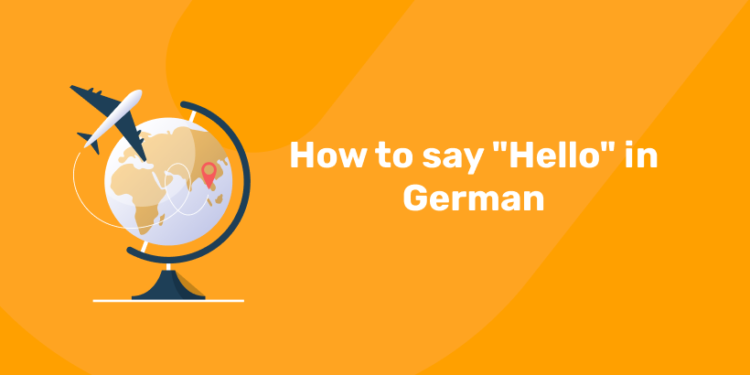Table of Contents
Introduction
Learning to say “Hello” in a new language is one of the first steps to becoming fluent. It’s part of communication whether you’re travelling, meeting new people or even doing business. In German, greetings are a big part of daily life and knowing how to say “Hello” correctly can set the tone for your conversation. In this post we’ll look at the different ways to say “Hello” in German, including the formal versions and give you some tips on how to practice and perfect your German greetings. By the end of this post you’ll not only know how to greet someone in German but also understand the cultural context behind the greetings. Plus if you want to improve your German further we’ll introduce you to a great resource: Entri’s German course.
How do you say “Hello” in German?
1: How do you say "Good Morning" in German?
The most common way to say “Hello” in German is “Hallo”. It’s a simple, casual greeting you can use in most situations. Whether you’re greeting a friend, family member or colleague in a relaxed setting, “Hallo” is a good and common way to go. Pronounced “hah-loh” it’s easy to remember and you can use it anytime you want to greet someone.
But German has many other ways to greet depending on the time of day and the formality of the situation. Here are some other ways to say “Hello” in German:
- “Guten Morgen” (Good Morning): Used in the morning until 11 AM.
- “Guten Tag” (Good Day): More formal and used throughout the day, after 11 AM and until early evening.
- “Guten Abend” (Good Evening): Used in the evening, from 6 PM.
These are more specific and will help you sound more natural in different situations.
Formal Greetings instead of “Hello” in German
In professional or formal situations you have to use the right greeting to show respect and politeness. While “Hallo” is common, there are some formal alternatives you should know:
- “Guten Tag” – This is the formal version of “Good Day” and is suitable for most situations, especially when you meet someone for the first time or in a business context. It’s a safe choice and works in spoken and written communication.
- “Grüß Gott” – Used in southern Germany and Austria, this greeting means “God bless” and is a formal yet friendly way to say hello. It’s mainly used in Bavaria and Austria, so if you’re in these regions, use this greeting to show cultural awareness.
- “Servus” – Another greeting from southern Germany and Austria, “Servus” is less formal than “Grüß Gott” but still polite. You can use it when you arrive and when you leave, so it’s a versatile greeting.
- “Moin” – In northern Germany, especially in Hamburg and Bremen, “Moin” is a common greeting you can use anytime of the day. While it’s informal, it’s widely accepted and can be used in semi-formal situations as well.
- “Guten Abend” – For evening events or meetings, “Guten Abend” is the formal way to greet someone. It’s the German version of “Good evening” and is perfect for social gatherings or professional events in the evening.
Now you know these formal alternatives, you can navigate different social situations in Germany better. Using the right greeting shows respect and makes a good impression on the people you meet.
Free German A1 Mock Tests – Powered by AI!
Test your skills on our interactive platform. Get instant feedback from our AI to help you communicate better and track your progress. Start your free German mock test now.
Test Your German A1 for FreeQuiz for How to say “Hello” in German
Quiz 1
Question: What is the most common way to greet someone with “Hello” in German, especially in casual settings?
- a) Guten Tag – This is more formal and translates to “Good day.”
- b) Hallo – A simple and common way to say “Hello” in most situations.
- c) Servus – Typically used in Austria and parts of southern Germany.
- d) Grüß Gott – A formal greeting used in southern Germany and Austria.
Answer: b) Hallo
Quiz 2
Question: How would you say “Good morning” in German when greeting someone early in the day?
- a) Guten Abend – This means “Good evening” and is used in the evening.
- b) Guten Morgen – The direct translation of “Good morning,” used in the morning.
- c) Guten Tag – Used throughout the day as “Good day.”
- d) Moin – A regional greeting used mainly in northern Germany at any time of day.
Answer: b) Guten Morgen
Quiz 3
Question: Which German greeting would be most appropriate for use in the evening?
- a) Hallo – A general greeting for any time of the day.
- b) Guten Tag – This means “Good day,” typically used during daytime.
- c) Guten Abend – The correct way to greet someone in the evening.
- d) Servus – Used as both “Hello” and “Goodbye” in certain regions.
Answer: c) Guten Abend
Quiz 4
Question: What is a formal way to greet someone during the day in German, suitable for business or formal settings?
- a) Moin – A casual, informal greeting used in northern Germany.
- b) Grüß Gott – Formal but more region-specific to southern Germany and Austria.
- c) Guten Tag – A formal greeting that translates to “Good day.”
- d) Hallo – Casual and less formal, suitable for everyday interactions.
Answer: c) Guten Tag
Quiz 5
Question: Which greeting is commonly used in southern Germany and Austria, often in religious or formal contexts?
- a) Grüß Gott – Directly translates to “God greet you” and is used in the south.
- b) Guten Tag – A formal greeting but more widespread across Germany.
- c) Servus – Used informally in both southern Germany and Austria.
- d) Moin – More common in the northern regions of Germany.
Answer: a) Grüß Gott
Quiz 6
Question: What greeting would you use in northern Germany, regardless of the time of day?
- a) Servus – More typical in the south and Austria.
- b) Guten Abend – Specifically used in the evening hours.
- c) Moin – A versatile greeting used any time in northern Germany.
- d) Guten Morgen – Used specifically in the morning.
Answer: c) Moin
Quiz 7
Question: How do you say “Good day” in German, often used from mid-morning until the evening?
- a) Guten Morgen – Specifically “Good morning.”
- b) Guten Tag – Directly translates to “Good day.”
- c) Guten Abend – This means “Good evening.”
- d) Grüß Gott – A more regional greeting, particularly in southern Germany.
Answer: b) Guten Tag
Quiz 8
Question: Which of these greetings is considered less formal in Germany: “Guten Tag” or “Hallo”?
- a) Guten Tag – Formal and used in business or polite social settings.
- b) Hallo – Less formal and used in casual everyday conversation.
Answer: b) Hallo
Quiz 9
Question: In which region of Germany would you most likely use the greeting “Grüß Gott”?
- a) During a business meeting – While formal, “Grüß Gott” is more region-specific.
- b) Greeting a friend in northern Germany – This greeting is rare in the north.
- c) In a church service – It’s formal but more for general greetings.
- d) In southern Germany or Austria – Most commonly used in these regions.
Answer: d) In southern Germany or Austria
Quiz 10
Question: What does “Servus” mean in German, and in which regions is it used?
- a) Hello and Goodbye – Servus is versatile and used both ways.
- b) Good Day – More formally translated as “Guten Tag.”
- c) Good Morning – Translated as “Guten Morgen.”
- d) Good Evening – The correct term would be “Guten Abend.”
Answer: a) Hello and Goodbye
Quiz 11
Question: Which greeting would be most appropriate for a formal evening event in Germany?
- a) Moin – Too casual for formal events.
- b) Guten Morgen – Not suitable for evening use.
- c) Guten Abend – The appropriate greeting for the evening.
- d) Servus – Informal and region-specific.
Answer: c) Guten Abend
Quiz 12
Question: What is the correct pronunciation of “Hallo” in German?
- a) hah-loh – This is the correct pronunciation.
- b) hah-low – This is incorrect.
- c) hah-lah – This is incorrect.
- d) hah-luh – This is incorrect.
Answer: a) hah-loh
Quiz 13
Question: How do you say “Goodbye” in German, often used in casual situations?
- a) Hallo – This means “Hello,” not “Goodbye.”
- b) Tschüss – A casual way to say “Goodbye.”
- c) Servus – Can mean both “Hello” and “Goodbye.”
- d) Moin – Used as “Hello” in northern Germany.
Answer: b) Tschüss
Quiz 14
Question: Which of the following is not a common greeting in Germany?
- a) Grüß Gott – Common in the south.
- b) Hola – Spanish for “Hello,” not used in Germany.
- c) Guten Morgen – Standard for “Good morning.”
- d) Moin – Used in northern Germany.
Answer: b) Hola
Quiz 15
Question: What is a casual way to greet someone in German that is widely understood?
- a) Guten Abend – More formal, used in the evening.
- b) Grüß Gott – Formal, region-specific to the south.
- c) Hallo – Casual and commonly used.
- d) Guten Tag – Formal and polite.
Answer: c) Hallo
Quiz 16
Question: Which greeting is used both as “Hello” and “Goodbye” in certain parts of Germany, especially in the south?
- a) Tschüss – Only means “Goodbye.”
- b) Moin – More common in the north, used for “Hello.”
- c) Servus – Can mean both “Hello” and “Goodbye.”
- d) Hallo – Generally means “Hello.”
Answer: c) Servus
Quiz 17
Question: How do you greet someone in German during the afternoon, especially in formal settings?
- a) Guten Abend – Used in the evening.
- b) Guten Morgen – Used in the morning.
- c) Guten Tag – Correct for afternoon use.
- d) Hallo – Casual and less time-specific.
Answer: c) Guten Tag
Quiz 18
Question: Which greeting is commonly used in Bavaria and is deeply rooted in local culture?
- a) Moin – More common in northern Germany.
- b) Grüß Gott – Widely used in Bavaria.
- c) Hallo – Casual and widespread.
- d) Guten Morgen – Used in the morning, not region-specific.
Answer: b) Grüß Gott
Quiz 19
Question: What is the informal greeting commonly used among young people in Germany, especially in casual settings?
- a) Guten Abend – More formal and specific to the evening.
- b) Moin – Region-specific, informal but not exclusive to young people.
- c) Grüß Gott – Formal, used in the south.
- d) Hallo – Informal and widely used by young people.
Answer: d) Hallo
Quiz 20
Question: What greeting might you use in a letter to a German-speaking friend, which is casual but appropriate?
- a) Guten Abend – Too formal for a casual letter.
- b) Hallo – Friendly and casual, perfect for a letter to a friend.
- c) Guten Tag – Polite but slightly formal for a casual letter.
- d) Grüß Gott – More formal and region-specific.
Answer: b) Hallo
Quiz 21
Question: In which German-speaking country is “Grüß Gott” predominantly used, and often associated with traditional culture?
- a) Germany – Yes, but more common in the south.
- b) Switzerland – Not widely used.
- c) Austria – Very common in Austria as well.
- d) Luxembourg – Not typically used here.
Answer: c) Austria
Quiz 22
Question: How do you say “Good evening” in German when greeting someone after sunset?
- a) Guten Tag – Used during the day, not evening.
- b) Guten Abend – The correct phrase for “Good evening.”
- c) Guten Morgen – Used in the morning.
- d) Guten Nacht – Means “Good night,” used before going to bed.
Answer: b) Guten Abend
Quiz 23
Question: Which greeting is best used in a formal business meeting in Germany, reflecting politeness and respect?
- a) Servus – Informal, not typically used in business.
- b) Hallo – Casual and less formal.
- c) Guten Tag – Formal and widely accepted in business settings.
- d) Grüß Gott – Formal but region-specific.
Answer: c) Guten Tag
Quiz 24
Question: Which greeting is used in both Austria and Switzerland, serving as a versatile way to say both “Hello” and “Goodbye”?
- a) Hallo – Common but not specific to these regions.
- b) Servus – Used in both Austria and Switzerland.
- c) Moin – Northern German, not common in Austria or Switzerland.
- d) Guten Morgen – Morning-specific, not region-specific.
Answer: b) Servus
Quiz 25
Question: How do you greet someone in the morning in a formal German setting, ensuring respect and politeness?
- a) Guten Tag – More general, used later in the day.
- b) Hallo – Too casual for formal settings.
- c) Guten Morgen – Perfect for formal morning greetings.
- d) Grüß Gott – Formal but region-specific.
Answer: c) Guten Morgen
Conclusion
Greeting in German is more than just learning a few phrases; it’s about the cultural context and choosing the right greeting for the right moment. Whether you use the casual “Hallo”, the formal “Guten Tag” or regional greetings like “Grüß Gott” each greeting matters.
If you want to get serious about your German, take a structured language course like Entri’s. Entri’s German course covers not only the basics but also the cultural context, pronunciation and advanced conversation. With structured lessons and practical exercises you’ll be ready for any German speaking situation.
Learning to say “Hello” in German is just the start. By continuing to practice and immerse yourself in the language you’ll find yourself getting more comfortable with other aspects of German too. So what are you waiting for? Start greeting the world in German today and open the doors to new opportunities and connections.
Free German A1 Mock Tests – Powered by AI!
Test your skills on our interactive platform. Get instant feedback from our AI to help you communicate better and track your progress. Start your free German mock test now.
Test Your German A1 for FreeFrequently Asked Questions
What is the most common way to say "Hello" in German?
The most common way to say “Hello” in German is “Hallo.” It is a simple and casual greeting suitable for most situations.
How do you say "Good Morning" in German?
“Good Morning” in German is “Guten Morgen.” This greeting is used in the morning, typically until around 11 AM.
What is the formal greeting used throughout the day in German?
The formal greeting used throughout the day is “Guten Tag,” which translates to “Good Day.” It is appropriate from late morning until early evening.
Which German greeting is used in the evening?
For evening greetings, you should use “Guten Abend,” which translates to “Good Evening.” This is suitable for use from around 6 PM onward.
What are some formal alternatives to "Hallo" in German?
Formal alternatives to “Hallo” include “Guten Tag” (Good Day), “Grüß Gott” (a regional greeting used in southern Germany and Austria), “Servus” (used in southern Germany and Austria), and “Moin” (used in northern Germany).
How can language learning apps help with German greetings?
Language learning apps like Duolingo, Babbel, and Rosetta Stone provide interactive exercises, pronunciation guides, and repetition exercises to practice German greetings effectively.
Why is practicing with native speakers important for learning German greetings?
Practicing with native German speakers helps you get accustomed to the flow of conversation and the appropriate use of greetings in various contexts, enhancing your overall language skills.
How can watching German media improve my greeting skills?
Watching German media such as TV shows, movies, or YouTube videos exposes you to how native speakers use greetings in different situations, helping you understand variations based on time of day and formality.
What role does repetition play in learning German greetings?
Repetition is crucial for memorizing greetings. Using flashcards and practicing daily helps reinforce vocabulary and integrate greetings into your daily routine.
How can a structured German course benefit my learning?
A structured German course, like Entri’s, covers basic to advanced greetings, provides pronunciation practice, listening exercises, and cultural insights, helping you understand and use German greetings more effectively.











